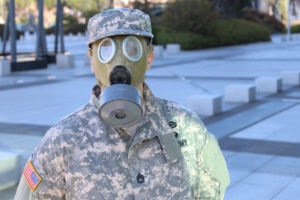
Atomic veterans are military members who were part of nuclear tests. They also include those who worked in areas with radiation exposure during their service. Many of them did not fully know the risks they were facing at the time. Years later, the health problems caused by this exposure have become clear.
The U.S. Department of Veterans Affairs has created programs to help atomic veterans. These programs offer health care, financial support, and other resources to improve their lives.
Who Are the Atomic Veterans?
You may be asking, “What is an atomic veteran?” These people are U.S. military members who were exposed to radiation during their service. This exposure happened through activities like:
- Nuclear weapons testing
- Being in Hiroshima or Nagasaki after the bombings
- Other radiation-related duties
These veterans had an important role in national security and nuclear technology. However, many now face serious health issues. This includes cancer due to the radiation they encountered in the line of duty. It is important they know about the benefits and support available to them.
Best VA Benefits for Atomic Veterans Exposed to Radiation
Atomic veterans should know about the range of VA benefits available to them, which includes:
1. Disability Compensation
The VA offers disability compensation to veterans for health problems caused by their service. Atomic veterans exposed to radiation may develop certain illnesses. This includes:
- Some cancers (like leukemia, lung, or thyroid cancer)
- Conditions like multiple myeloma
The VA has a list of 21 illnesses linked to radiation exposure. Veterans need to show they were involved in radiation-related activities. They do not need to prove that the illness was directly caused by their service. Compensation is a monthly payment. The amount depends on how serious the disability is.
2. VA Healthcare Services
Atomic veterans can get healthcare through the VA. The VA provides free or low-cost medical care for health problems connected to their service.
This includes treatment for:
- Illnesses caused by radiation
- Conditions that developed because of those illnesses
Services cover:
- Doctor visits
- Hospital stays
- Medication
- Specialized care for cancer and other long-term illnesses
Mental health support is also available. It can help with the emotional effects of their service and health issues.
3. The Radiation Exposure Compensation Act (RECA)
The Radiation Exposure Compensation Act (RECA) is a federal program. It gives compensation for veterans exposed to radiation while in the line of duty. It also provides money to their families.
The VA is responsible for making sure that veterans receive their due compensation under the RECA. It provides up to $75,000 to veterans who got sick due to radiation exposure. RECA also helps some civilians who worked on nuclear testing. The program ended in 2024. However, if you submitted a claim postmarked on or before June 10, 2024, you may still be able to receive help.
4. Specialized VA Programs for Cancer Treatment
The VA provides special programs to help atomic veterans with cancer from radiation exposure. Many VA hospitals have advanced cancer treatment options.
Veterans can get help with:
- Diagnosis
- Treatment
- Recovery
- Care for serious illnesses
They can also join support groups and access resources about their condition. These services are designed to take care of their health and emotional well-being.
5. Veterans Pension Program
The Veterans Pension Program is a financial support benefit. It is for wartime veterans with limited income. It is not specific to atomic veterans. But those with health problems due to radiation often qualify given their reduced ability to work. The VA provides pension benefits to those who meet income and health-related criteria.
For atomic veterans, this can ease financial burdens. It also makes sure they can access necessary healthcare services.
6. Dependency and Indemnity Compensation (DIC)
Dependency and Indemnity Compensation (DIC) is a tax-free payment. It is given to families of atomic veterans who passed away due to service-related reasons. For example, let’s suppose a veteran’s death was caused by a radiation-related illness. Their spouse, children, or sometimes parents may qualify. This support helps ease financial challenges after losing a loved one.
7. Ionizing Radiation Registry Health Exam
The VA provides a free Ionizing Radiation Registry Health Exam for atomic veterans. This exam checks for health issues that may be linked to radiation exposure. It includes reviewing your medical and service history and any risks from radiation. It does not count as a disability claim. Still, it helps identify health concerns and connect you to follow-up care.
8. Grants for Home and Adaptive Changes
The VA gives grants to help atomic veterans with disabilities change their homes. These grants pay for things a veteran might need at home, like:
- Ramps
- Wider doors
- Easier-to-use bathrooms
The goal is to make homes safer and more comfortable for veterans with health problems.
9. Burial and Memorial Benefits
The VA offers burial and memorial benefits for atomic veterans. These include burial in a national cemetery, a government-provided headstone, and a burial flag. These honors show respect for their service and sacrifice. Families can use these benefits to ensure their loved ones are remembered properly.
What is an Atomic Veteran? Help for Atomic Veterans Exposed to Radiation
Getting benefits as an atomic veteran can feel hard to understand, but there is help to make it simpler. The VA has tools and people to guide veterans step by step. They can help you fill out forms to apply for benefits and find special services made just for you. These supports are there to make sure you get what you need and deserve.
At the Cancer Benefits Center for Downwinders®, we are here to support veterans every step of the way. Do you believe you qualify for compensation or benefits as an atomic veteran? If so, you can trust our team to advocate for you. To determine your eligibility, please fill out our registration form today.
We look forward to serving you!
Sources:
